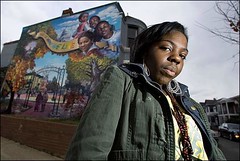
Kari Fulton, a young activist who helped register young black voters for the presidential election, worries interest in the fight against discrimination may be flagging in the wake of the outcome. (Manuel Balce Ceneta / Associated Press)
Originally uploaded by Pan-African News Wire File Photos
Racial gulfs persist: Inequalities aren't ending with election of Obama
Stephen Ohlemacher / Associated Press
WASHINGTON -- The day after Barack Obama was elected president, Kari Fulton heard a white colleague proclaim that racism in America is dead.
She cringed, worrying it might be a sign of flagging interest in the fight against discrimination.
"In reality, racism is still very much alive and well," said Fulton, who graduated last year from Howard University, a historically black college in the nation's capital.
Obama's election has generated a euphoria among black Americans that is palpable.
For some, the weight of history has finally been eased after generations of struggling for equality. But amid the postelection glow of racial harmony lurks a sobering fact: Racial disparities persist -- in just about every measurable form -- and they won't simply melt away because the nation has a black president.
Fulton, 23, was part of a group of young black activists from across the country who worked to register and turn out young black voters in the presidential election. The National Coalition on Black Civic Participation brought the group together shortly after the election to learn about converting their enthusiasm into ongoing political activism.
"Election Day was just the beginning," said Fulton, who lives in Washington and works as an organizer for the Environmental Justice and Climate Change Initiative. "People don't expect President Obama to be a superhero. We have to solve our own problems."
The problems are significant.
About a quarter of black Americans live in poverty -- nearly three times the rate for whites -- at a time when rising budget deficits and expensive corporate bailouts are going to leave little federal money for anti-poverty programs. The federal budget deficit is likely to hit a record $1 trillion next year.
Black adults are less likely than whites to have college degrees and more likely to be in prison. Blacks are less likely than whites to have health insurance and, on average, they don't live as long as whites. Homicide is the leading cause of death among black males ages 15-34 -- and it has been for years.
The good news: Poverty and education levels for blacks have improved in the past two decades, and incarceration rates for blacks are dropping even as they increase for whites.
Still, the income gap has barely changed in 30 years, with a typical black household making only 62 percent of the income of a typical white household.
In his election-night victory speech, Obama talked about the historic nature of his election.
But he had spent much of the campaign soft-pedaling race; he acknowledged its role in society, but rarely brought it up on his own.
Nevertheless, many black Americans, who voted more than 9-to-1 for Obama, have embraced his victory as their own.
Others didn't greet Obama's election so warmly.
Since Election Day, authorities across the nation have documented numerous alleged hate crimes related to Obama's election.
More threats have been directed toward Obama than any other president-elect, including potentially threatening writings, Internet postings and other activities, authorities say.
The Rev. Lennox Yearwood Jr., president and CEO of the Hip Hop Caucus, compared Obama's election to Jackie Robinson breaking the Major League Baseball color barrier in 1947.
No comments:
Post a Comment